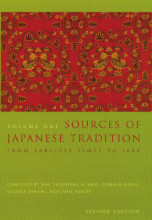Chinese thought and institutions in early Japan - Inauguration of the Great reform era - Reform edicts
6 important questions on Chinese thought and institutions in early Japan - Inauguration of the Great reform era - Reform edicts
What is a custodian?
Which were the events that lead to the Emperor's edict in the year 645, 9th month, 19th day, saying: "From this time forward the sale of the land is not allowed." ?
What are the four terms of the edict as told by the emperor in 646, Spring, 1st month 1st day?
2. The capital is for the first time to be regulated, and governors appointed for the home province and districts.
3. From now on there will be registers of population, books of account and a system of the receipt and regranting of distribution land.
4. The old taxes and forced labor are abolished, and a system of commuted taxes instituted.
- Higher grades + faster learning
- Never study anything twice
- 100% sure, 100% understanding
646, 8th month, 14th day. What does the edict issues here say?
Whom should commuted taxes be collected from?
What is the source for these reform edicts?
The question on the page originate from the summary of the following study material:
- A unique study and practice tool
- Never study anything twice again
- Get the grades you hope for
- 100% sure, 100% understanding































